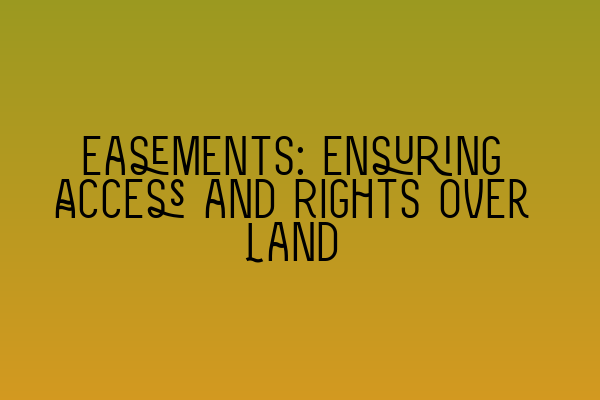Easements: Ensuring Access and Rights over Land
Welcome to the SQE Property Law & Land Law blog! In this article, we will explore the concept of easements and their significance in property law. Easements play a crucial role in ensuring access and rights over land, and it is essential to understand how they work to protect your property interests. So, let’s dive in!
What are Easements?
An easement is a legal right that allows someone who does not own a piece of land to use or access that land for a specific purpose. It grants the holder of the easement certain rights over the land owned by another person. These rights typically relate to access, services, or the use of amenities on the land.
For example, let’s say you own a property that is only accessible through a private road belonging to your neighbor. In this case, you would need an easement to have a legal right to use that road to access your property. Easements can also cover various other rights, such as the right to use a driveway, install utilities, or access a water source on someone else’s land.
The Importance of Easements
Easements are essential because they provide security and peace of mind to property owners. Without proper easements in place, disputes and conflicts may arise over access to necessary facilities or amenities. By establishing and registering easements, property owners can ensure a smooth and uninterrupted use of their land.
Moreover, easements can also increase the value of a property. For instance, if a property has an easement allowing direct access to a beach or waterfront, it becomes more desirable and attractive to potential buyers. Easements can, therefore, have a significant impact on property valuation and marketability.
Creating Easements
Easements can be created in several ways, depending on the circumstances and the legal requirements of the jurisdiction. The most common methods of creating easements include express grant, implication, prescription, and necessity.
An express grant occurs when the owner of the land voluntarily grants an easement to another party. This is typically done through a written agreement or deed that outlines the specific terms and conditions of the easement.
Implication, on the other hand, arises when there is an implied intention or necessity for an easement to exist. This could occur if a property is landlocked, and access must be granted over a neighboring property.
Parties in a Contract: Rights and Responsibilities
Unveiling Duress and Undue Influence in Contracts
Another method of creating an easement is prescription, which is based on long and continuous use of someone else’s land without permission. If a person has openly and continuously used a right for a specific period, known as the prescriptive period, they may acquire a legal right to continue using the land.
Finally, necessity arises when an easement is strictly necessary for the reasonable use and enjoyment of a property. This typically applies in situations where a property is physically or legally incapable of access without an easement, such as when a property is entirely surrounded by other properties.
Legal Considerations and Disputes
When dealing with easements, it is crucial to consult with a qualified property law solicitor to ensure all legal requirements are met and potential disputes are avoided. A solicitor can assist with the creation, registration, and interpretation of easements, as well as provide advice on resolving any conflicts that may arise.
Interactive SQE Mock Tests for Contract Law: Test Your Knowledge
Contract Law Reforms: An Analysis of Recent Changes
The Importance of Ethics in Contract Law: A Comprehensive Guide
In conclusion, easements are a vital aspect of property law that allows individuals to access and utilize land they do not own. By establishing easements, property owners can secure their rights and prevent conflicts over access and usage. If you are dealing with easements or have questions about your property rights, it is crucial to seek professional legal advice to ensure your interests are protected.
We hope you found this article informative and helpful. Stay tuned for more interesting and educational content from SQE Property Law & Land Law!
